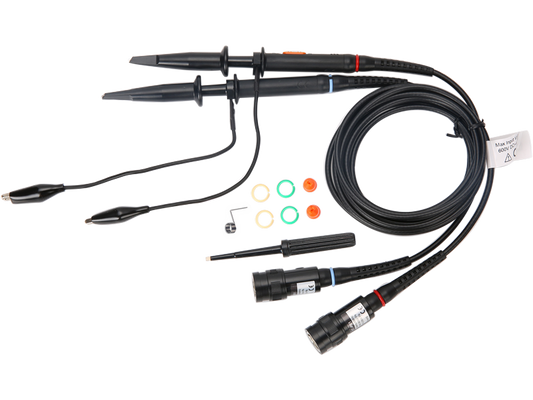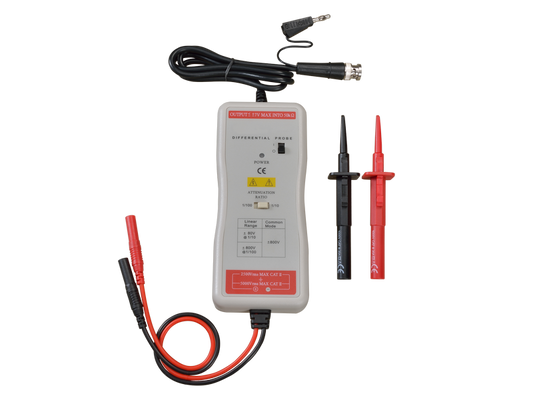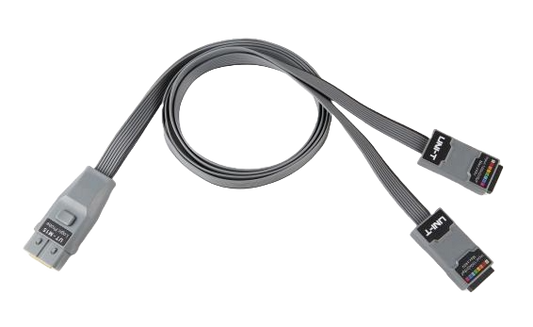Key Features
• Complete SMBus protocol decoding with command and data analysis
• I²C physical layer compatibility with SMBus protocol extensions
• Advanced triggering on SMBus-specific commands and device addresses
• Packet Error Code (PEC) validation for communication reliability
• SMBus command classification and parameter extraction
• Device address analysis and conflict detection
• Timeout analysis and bus arbitration validation
• Integration with signal integrity analysis for EMC validation
• Protocol search and navigation through extensive SMBus transactions
• Automated system management command analysis
• Power management and thermal monitoring protocol support
• Seamless integration with MSO8000HD's embedded analysis ecosystem
Compatibility Information
Compatible Models: MSO8804HD, MSO8504HD
Installation: Software license activation - no hardware modification required
Supported Standards: SMBus specification versions 1.1, 2.0, and 3.0
Signal Requirements: Standard SMBus SDA/SCL two-wire interface
Bundle Savings Opportunity
This option is included in the MSO8000HD-BND Protocol Analysis & Jitter Suite! Get this capability plus 15 other protocol analysis options and jitter analysis for just $5,399 - saving you $10,583 (66% off) compared to purchasing options individually.
The bundle features perpetual licensing with zero recurring fees, potentially saving $10,000+ over the instrument's lifetime compared to competitors' subscription models.
Professional Applications
Computer and Server System Management
Validate SMBus implementation in computer motherboards, server systems, and enterprise hardware including power supply management, CPU thermal monitoring, memory module management, and system health reporting. The SMBus analysis enables comprehensive validation of system management functions critical for reliable computer and server operation.
Embedded Power Management Systems
Analyze SMBus communications in embedded power management applications including battery management systems, power supply controllers, and energy harvesting systems. The detailed protocol analysis capabilities enable optimization of power management algorithms and validation of power system reliability under varying load conditions.
Industrial and IoT System Monitoring
Support SMBus analysis for industrial control systems and IoT applications where system health monitoring, thermal management, and power optimization are critical for reliable operation. The comprehensive analysis capabilities enable validation of system management protocols in demanding industrial environments.
Battery Management and Charging Systems
Engineers developing battery management systems can utilize the SMBUS option to validate Smart Battery Data (SBD) communications, battery fuel gauge protocols, and charging system management. The automated analysis capabilities enable comprehensive validation of battery management algorithms essential for mobile devices and electric vehicle applications.
Frequently Asked Questions
What makes SMBus different from standard I²C communication?
SMBus extends I²C with additional protocol layers including standardized command sets, Packet Error Code (PEC) for error detection, timeout specifications, and defined electrical characteristics. While I²C is a general-purpose communication protocol, SMBus is specifically designed for system management applications with enhanced reliability features.
Can the SMBUS option analyze systems that mix SMBus and I²C devices?
Yes, the SMBUS option can analyze mixed SMBus/I²C systems since SMBus is electrically compatible with I²C. The analyzer automatically identifies SMBus-specific features like PEC validation and command classification while maintaining compatibility with standard I²C transactions from non-SMBus devices.
How does the option handle SMBus Packet Error Code (PEC) validation?
The SMBUS option automatically validates PEC-8 error codes for all SMBus transactions that include PEC bytes. The analyzer calculates expected PEC values and compares them with received PEC bytes, flagging communication errors and providing detailed error analysis for system management reliability assessment.
Does the SMBUS analysis support Smart Battery Data (SBD) protocols?
Yes, the MSO8000HD-SMBUS option includes comprehensive analysis of Smart Battery Data protocols commonly used in battery management systems. The analyzer can decode battery status commands, fuel gauge data, and charging control communications essential for mobile device and electric vehicle battery management applications.
Can I correlate SMBus system management data with power measurements?
Yes, the SMBUS option integrates seamlessly with other MSO8000HD analysis capabilities including power analysis, enabling correlation between SMBus power management commands and actual power consumption measurements. This capability is valuable for validating power management algorithm effectiveness and system efficiency optimization.
Is SMBus analysis included in the bundle package?
Yes, SMBus analysis is included in the MSO8000HD-BND Protocol Analysis & Jitter Suite. The bundle provides 15 protocol analysis options plus advanced jitter analysis at a single price of $5,399 - saving 66% compared to purchasing options individually. As with all UNI-T software options, the bundle features a perpetual license with zero recurring fees, providing lifetime access without subscription costs that can save $10,000+ over the instrument's lifetime.
Master Embedded System Management
The MSO8000HD-SMBUS option provides the specialized analysis capabilities essential for validating SMBus system management communications in modern embedded applications. Whether developing power management systems, validating thermal monitoring protocols, or troubleshooting battery management systems, this option delivers the insight needed to ensure reliable system management operation under demanding embedded system requirements.
Ready to analyze your embedded SMBus systems? Order the MSO8000HD-SMBUS or get it included in the MSO8000HD-BND Complete Suite and save significantly on comprehensive embedded protocol analysis capabilities.




